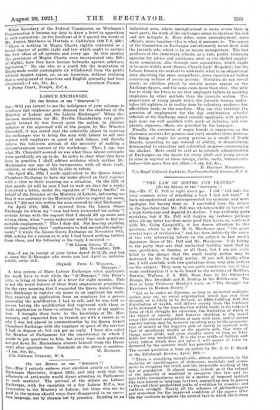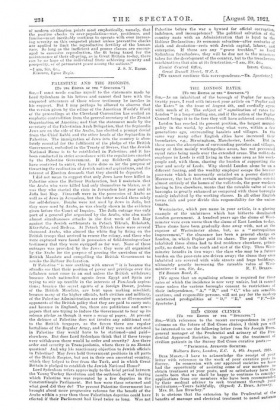"THE LAW OP BIRTHS AND DEATHS." (To rim EDITOR OP
THE " SPECTATOR.") SIR,—Mr. C. E. Pell is right about Rte. I did " fall into the very common error of attacking a book I had not read." I have misunderstood and misrepresented his opinions, and must apologize for having done so. I concluded from the review in the Spectator that Mr. Pell was wholeheartedly in favour of a high birth-rate and deposed its decline. I was evidently quite mistaken, but if Mr. Pell will forgive my rashness perhaps after all my letter has done more good than harm, as, combined with Mr. Colin Campbell's, it has drawn attention to this question, which is, as Mr. H. G. Mirehouse says, " the great crucial topic of civilization," and has been indirectly the cause of two very interesting letters on the subject in last week's Spectator, those of Mr. Pell and Mr. Mirehouse. I do belong to the party that sees that unchecked fertility must lead to war, pestilence, or famine, or all three, but I am not quite blind to the danger that the small family nation may be destroyed by the big family nation. If you will kindly allow me, I will conclude with two quotations from very able writers on the subject. They seem to me quite conclusive, but if they want confirmation it is to be found in the writiaes of Malthus, Darwin, Wallace, J. S. Mill, Dean Inge in his Outspoken Essays, Drs. Drysdale and B. Dunlop in the Malthusian. The first is from Professor Huxley's essay on "The Struggle for Existence in Human Society."
"Let us he under no illusions, so long as unlimited multipli- cation goes on, no social organization which has ever been devised, or is likely to be devised, no fiddle-faddling with the distribution of wealth, will deliver society from the tendency to be destroyed by the reproduction within itself, in its intsnsest form of that struggle for existence, the limitation of which is the object of society. And however shocking to the moral sense this eternal oompetition of man with man, and of nation against nation, may be, however revolting may be the accumula- tion of misery at the negative pole of society in contrast with that of monstrous wealth at the positive pole, this state of things must abide, and grow steadily worse so long as Istar holds her way unchecked. This the true riddle of Sphinx, and every nation which does not solve it will sooner or later be devoured by the monster itself has generated." The second quotation is from an article by Mr. J. 0. P. Bland in the Edinburgh Review, April, 1918 :— " There is something inexplicable, almost mysterious, in the inability or unwillingness of statesmen, moralists and econo- mists to recognize the truth and the inexorable working of the law of population. It almost seems, indeed, as if the refusal of the majority of mankind to recognize this law and its inevitable consequences must be a matter of imposed instinct like race hatred or language barriers, compelling men to pursue to the end their predestined paths of evolution by ceaseless and ruthless struggle. Nearly all the schemes of philanthropists and statesmen for the improved condition of the masses after the war continue to ignore the central fact to which the history of modern civilization points most emphatically, namely, that the positive checks to over-population—war, pestilence, and famine—must inevitably continue to operate with ever increas- ing severity on this congested planet unless preventive checks are applied to limit the reproductive fertility of the human race. So long as the inefficient and poorer classes are encour- aged to excessive reproduction, the fit being taxed for the maintenance of their offspring, as in Great Britain to-day, there can be no hope of the individual State achieving security and prosperity, or of permanent peace among the nations."
Kincora, Lyme Regis.



































 Previous page
Previous page